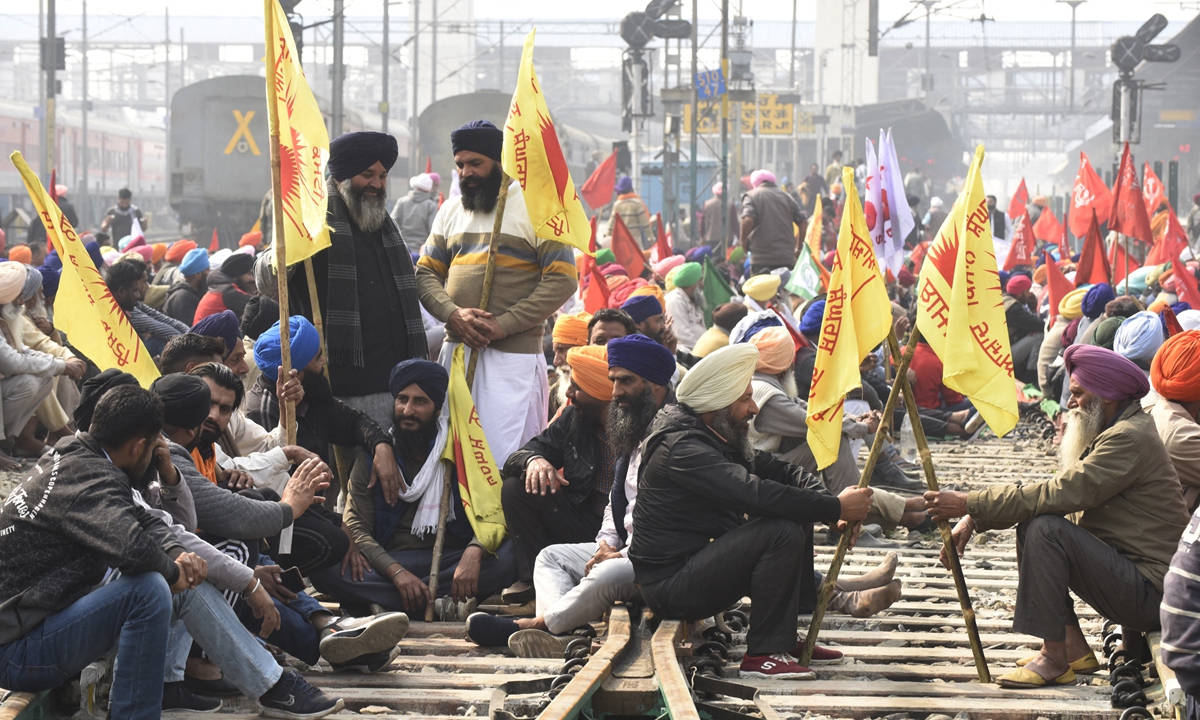
Farmers block railway tracks during a four-hour rail blockade as they continue their protest against the central government's recent agricultural reforms, at a railway station in Amritsar, India on Thursday. Authorities deployed thousands of security forces at railroad stations and tracks to prevent violence. Photo: AFP
On Tuesday, CNN published an opinion piece entitled "Why Biden should be careful about courting India's Modi government." It warned the Biden administration to avoid an "all carrots" courtship with India because, "it's not in America's interest to become close partners with countries moving away from shared values." It underlined India's alarming "negative rights trend," but criticized the Biden administration for only making "mild" critiques against the regressive actions of the Modi government.Under Trump presidency, Washington didn't say much about India's human rights violations as the president didn't care much about values such as "democracy" and "human rights." President Joe Biden pledged to put human rights back at the core of US foreign policy. But ironically, his administration restrained from criticizing India over human rights issues facing India's worrying human rights record. Whereas it needs to draw India to its side due to geopolitical reasons, the Biden administration is rather restrained in speaking out against India's human rights violations.
Voices demanding the Biden administration to pay more attention to India's human rights issues are mainly coming from India's opposition parties, as well as Indian-American officials and groups in the US. Most of them disagree or object to the Modi government's Kashmir moves, the Citizenship Amendment Bill (which many Westerners consider fundamentally discriminatory), and the Modi government's response to farmer protests. The ancestors of many Indian-Americans moved to the US partly because they suffered suppression and discrimination in India due to caste or ethnic issues. Therefore, Indian-American communities eagerly hope the US government will harshly criticize India's human rights abuses.
Although India claims to be the biggest democracy in the world, the US knows very well that India's democracy is different from that of the West. Many Americans and Westerners disapprove the Modi government's Hindu nationalist policies. In fact, the US has already been aware of India's human rights issues, but it still claims that India is a like-minded democracy. This has laid bare the US' hypocrisy. Geopolitical demands have been placed above human rights.
As a matter of fact, the Biden administration may use India's human rights issues as a bargaining chip, demanding India to make concessions at the economic level, or cooperate with the US in the containment strategy against China. It may also ask India to offer more support to the US within the Quad group.
There are also some Indians who question India's decision to move closer to the US and Quad. They say that the US is unreliable, and is opposing any finger-pointing from the Washington over India's human rights issues. But the Modi government, which has a clear strategic goal to realize by deepening relations with the US, won't be affected by these noises. Although many Americans and Westerners have many doubts over India's human rights issues, this won't affect the US-India cooperation including that within Quad. The Biden administration and Modi government have common interests in containing China. This is their priority. They won't allow differences over India's human rights issues to affect their geopolitical cooperation to contain China.
In the short term, if domestic voices that demand the US to speak loudly about India's human rights issues grow, it's very likely that the Biden administration will express some concerns or exert pressure on the Modi government. But it won't impose substantive sanctions on India. This poses a sharp contrast to Washington's brazen acts of fabricating lies to attack China over alleged human rights violations in Xinjiang. When it comes to human rights issues, the US double standards are obvious to all.
The author is secretary-general of the Research Center for China-South Asia Cooperation at Shanghai Institutes for International Studies, visiting fellow of the Chongyang Institute for Financial Studies, Renmin University of China and distinguished fellow of the China (Kunming) South Asia & Southeast Asia Institute. opinion@globaltimes.com.cn
